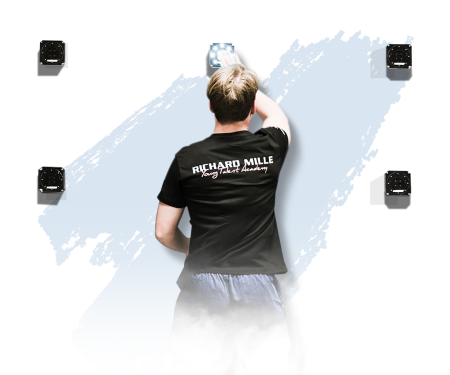SPORTS TEST
The FFSA Academy offers pilots the opportunity to refine their sporting assessment by passing a series of tests according to their needs. It is to allow them to better understand their strengths and weaknesses in order to set up a personalized training program as precise as possible.

These tests are open to all French and foreign pilots who wish to improve their physical condition according to specific needs related to piloting.
THE TESTS ARE DIVIDED INTO FOUR PARTS
LUC LEGER’S CARDIO TEST
This test is known worldwide, as it allows to estimate one’s Vo² Max, the maximum oxygen capacity a driver is able to use during an intense workout. The results from the test help to develop an individualized program for the athlete.
PLANK TEST
This test helps the driver to keep control of his balance between the back and the abdominals by contracting the abs. Two tests that are medically approved are used: the Shirado and Sorensen’s tests. Depending on the results, the workouts are adapted on the weak points. The back of drivers is really taking some hits during races with the vibrations, shakings, and other sollcitations that are constant. Theses tests bring more information to adjust the driver’s training.
TEST FOR THE UPPER MUSCLES
The upper muscles, depending on the racing category, can be quite solicited and use up to 70% of the V0² max during the competition. Thus, this muscular group needs to be well-prepared in accordance to the category in which the driver evolves.
MAXIMUM FORCE OF THE NECK
AND THE RELATION BETWEEN FORCE AND SPEED
For the young drivers, the transition between the Formula Renault 2.0 to upper categories is very difficult and tough on the cervicals. They often endure 3,5 G, which represents 320 N to hold around 10 times every lap. The tool created by the FFSA Academy allows to control the driver’s force and to measure the time needed for the driver to reach his optimum force. The results allow to direct the work toward either strength or explosivity.
EXPLOSIVE FORCE OF THE LOWER BODY MUSCLES
This test gives information over the driver’s capacity to be as quick as possible with his lower body, which reflects on pedal’s speed or brakes’ attack.
MEMORIZATION OF THE BRAKE’S PRESSURE
The sensorial memorization allows the driver to repeat the same pressure on the brake for any situation. The FFSA Academy has put together a cockpit which allows to work on this parameter with pedals that look exactly like the one true race cars have. It allows to work on the driver’s capacity to reproduce the same pressure despite tiredness while keeping the maximum precision.
FLEXIBILITY TEST
This test measures the balance between all the muscle channels, allowing the instructors to work toward physical preparation through compensation or directly toward the optimization of the performance. It prevents the athlete from getting injuries related to bad training.
QUICKNESS
The speed of reacting to a signal is very important in motorsport. The wall of quickness allows to see how the driver maintains his speed of reaction over time. By analyzing all the data, the FFSA Academy can determine a driver’s awareness and concentration qualities. It is also possible to set the driver up in a stressful situation to measure the impact of the cardio activity on his reactivity.
MEMORIZATION AND DISSOCIATION
The memorization of markers around circuits is very important for the drivers, and their ability to dissociate the look from their propioceptive attention is a key quality for motorsport. A balance test, with the need to read simultaneously information on a wall, helps to evaluate this quality.
HAND-EYE COORDINATION
In order to assess the driver’s quality to adjust each movement to a signal, the FFSA Academy use a well-known tool called « Mr CUBE ». It tests the ability to stay focus on a hard task. Six exercises linked to a database allow the driver to rank himself according to the elite of the discipline.
PODIATRIC TESTS
This test allows to detect feet problems in order to advise for correct soles, if needed. It is a crucial step before physical training, to avoid muscular or sinewy problems.
PSYCHOLOGICAL TESTS
Conducted by a sports psychologist, this test allows to determine the profile of the driver and to know his/her needs to deal with stress, and find solutions to be in the best emotional state possible during competitions.
Conducted on gravel and asphalt tracks in Le Mans, with a Renault Clio 3, these tests allow to observe and measure the driver’s abilities in diverse situations created by the FFSA Academy instructors, in order to observe his ability to:
ADAPT HIS DRIVING POSITION INSIDE EVERY VEHICLE
Distances back/hands, back/feet, good balance thanks to the left foot
CALL OUT HIS TECHNICAL KNOWLEDGE
Choice of trajectories, knowledge of cars
ADJUST QUICKLY TO EVERY VEHICLE
Find the tyres’ limit on different surfaces, estimate the efficiency of his driving over the tests zone, repeat precisely an action over the same exercise while staying at the limits of efficacy, provoke or stop an adherence loss
ADAPT QUICKLY TO ADHERENCE CONDITIONS WHEN USING THE BRAKES
Give the right pressure to brake, find the perfect breaking point according to adherence and track conditions

